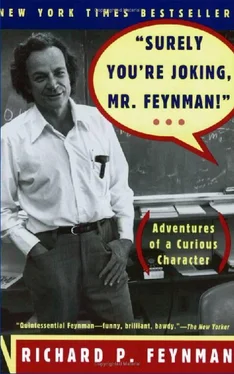Sometime later the woman who took care of my room came in and said something—in Japanese—about a bath. I knew that Japanese baths were interesting and was eager to try it, so I said, “Hai.”
I had read that Japanese baths are very complicated. They use a lot of water that’s heated from the outside, and you aren’t supposed to get soap into the bathwater and spoil it for the next guy.
I got up and walked into the lavatory section, where the sink was, and I could hear some guy in the next section with the door closed, taking a bath. Suddenly the door slides open: the man taking the bath looks to see who is intruding. “Professor!” he says to me in English. “That’s a very bad error to go into the lavatory when someone else has the bath!” It was Professor Yukawa!
He told me that the woman had no doubt asked do I want a bath, and if so, she would get it ready for me and tell me when the bathroom was free. But of all the people in the world to make that serious social error with, I was lucky it was Professor Yukawa!
That Japanese-style hotel was delightful, especially when people came to see me there. The other guys would come in to my room and we’d sit on the floor and start to talk. We wouldn’t be there more than five minutes when the woman who took care of my room would come in with a tray of candies and tea. It was as if you were a host in your own home, and the hotel staff was helping you to entertain your guests. Here, when you have guests at your hotel room, nobody cares; you have to call up for service, and so on.
Eating meals at the hotel was also different. The girl who brings in the food stays with you while you eat, so you’re not alone. I couldn’t have too good a conversation with her, but it was all right. And the food is wonderful. For instance, the soup comes in a bowl that’s covered. You lift the cover and there’s a beautiful picture: little pieces of onion floating in the soup just so; it’s gorgeous. How the food looks on the plate is very important.
I had decided that I was going to live Japanese as much as I could. That meant eating fish. I never liked fish when I was growing up, but I found out in Japan that it was a childish thing: I ate a lot of fish, and enjoyed it. (When I went back to the United States the first thing I did was go to a fish place. It was horrible—just like it was before. I couldn’t stand it. I later discovered the answer: The fish has to be very, very fresh—if it isn’t, it gets a certain taste that bothers me.)
One time when I was eating at the Japanese-style hotel I was served a round, hard thing, about the size of an egg yolk, in a cup of some yellow liquid. So far I had eaten everything in Japan, but this thing frightened me: it was all convoluted, like a brain looks. When I asked the girl what it was, she replied “kuri.” That didn’t help much. I figured it was probably an octopus egg, or something. I ate it, with some trepidation, because I wanted to be as much in Japan as possible. (I also remembered the word “kuri” as if my life depended on it—I haven’t forgotten it in thirty years.)
The next day I asked a Japanese guy at the conference what this convoluted thing was. I told him I had found it very difficult to eat. What the hell was “kuri”?
“It means ‘chestnut.’ ” he replied.
Some of the Japanese I had learned had quite an effect. One time, when the bus was taking a long time to get started, some guy says, “Hey, Feynman! You know Japanese; tell ’em to get going!”
I said, “Hayaku! Hayaku! Ikimasho! Ikimasho!” —which means, “Let’s go! Let’s go! Hurry! Hurry!”
I realized my Japanese was out of control. I had learned these phrases from a military phrase book, and they must have been very rude, because everyone at the hotel began to scurry like mice, saying, “Yes, sir! Yes sir!” and the bus left right away.
The meeting in Japan was in two parts: one was in Tokyo, and the other was in Kyoto. In the bus on the way to Kyoto I told my friend Abraham Pais about the Japanese-style hotel, and he wanted to try it. We stayed at the Hotel Miyako, which had both American-style and Japanese-style rooms, and Pais shared a Japanese-style room with me.
The next morning the young woman taking care of our room fixes the bath, which was right in our room. Sometime later she returns with a tray to deliver breakfast. I’m partly dressed. She turns to me and says, politely, “Ohayo, gozai masu,” which means, “Good morning.”
Pais is just coming out of the bath, sopping wet and completely nude. She turns to him and with equal composure says, “Ohayo, gozai masu,” and puts the tray down for us.
Pais looks at me and says, “God, are we uncivilized!”
We realized that in America if the maid was delivering breakfast and the guy’s standing there, stark naked, there would be little screams and a big fuss. But in Japan they were completely used to it, and we felt that they were much more advanced and civilized about those things than we were.
I had been working at that time on the theory of liquid helium, and had figured out how the laws of quantum dynamics explain the strange phenomena of super-fluidity. I was very proud of this achievement, and was going to give a talk about my work at the Kyoto meeting.
The night before I gave my talk there was a dinner, and the man who sat down next to me was none other than Professor Onsager, a topnotch expert in solid-state physics and the problems of liquid helium. He was one of these guys who doesn’t say very much, but any time he said anything, it was significant.
“Well, Feynman,” he said in a gruff voice, “I hear you think you have understood liquid helium.”
“Well, yes.”
“Hoompf.” And that’s all he said to me during the whole dinner! So that wasn’t much encouragement.
The next day I gave my talk and explained all about liquid helium. At the end, I complained that there was still something I hadn’t been able to figure out: that is, whether the transition between one phase and the other phase of liquid helium was first-order (like when a solid melts or a liquid boils—the temperature is constant) or second-order (like you see sometimes in magnetism, in which the temperature keeps changing).
Then Professor Onsager got up and said in a dour voice, “Well, Professor Feynman is new in our field, and I think he needs to be educated. There’s something he ought to know, and we should tell him.”
I thought, “Geesus! What did I do wrong?”
Onsager said, “We should tell Feynman that nobody has ever figured out the order of any transition correctly from first principles, so the fact that his theory does not allow him to work out the order correctly does not mean that he hasn’t understood all the other aspects of liquid helium satisfactorily.” It turned out to be a compliment, but from the way he started out, I thought I was really going to get it!
It wasn’t more than a day later when I was in my room and the telephone rang. It was Time magazine. The guy on the line said, “We’re very interested in your work. Do you have a copy of it you could send us?”
I had never been in Time and was very excited. I was proud of my work, which had been received well at the meeting, so I said, “Sure!”
“Fine. Please send it to our Tokyo bureau.” The guy gave me the address. I was feeling great.
I repeated the address, and the guy said, “That’s right. Thank you very much, Mr. Pais.”
“Oh, no!” I said, startled. “I’m not Pais; it’s Pais you want? Excuse me, I’ll tell him that you want to speak to him when he comes back.”
A few hours later Pais came in: “Hey, Pais! Pais!” I said, in an excited voice. “ Time magazine called! They want you to send ’em a copy of the paper you’re giving.”
Читать дальше












